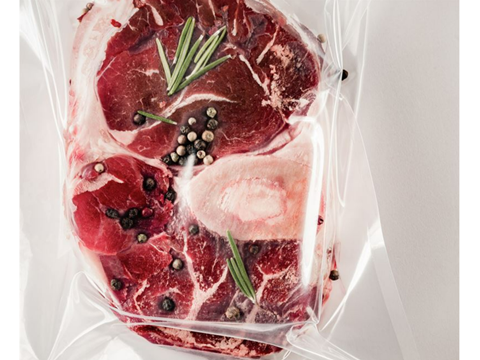
Niederwieser Group, Dow and Kuraray have joined forces to create recyclable vacuum bags for the food industry, aiming to meet the upcoming PPWR requirements, ensure legal compliance and reduce environmental impact.
In light of the upcoming EU Packaging and Packaging Waste Regulation (PPWR), the three companies are hoping to address the evolving regulatory framework with their design. The partners state they are working on an alternative to conventional vacuum bags that features a high polyethylene (PE) content, is fully recyclable and ensures the packaging integrity and food quality required throughout the value chain.
Kuraray claims that switching to PE-rich solutions allows for better adaptation to mechanical recycling streams, adding that the bags also include EVAL, an ethylene vinyl alcohol copolymer (EVOH) resin.
The bags’ high-performance oxygen barrier is said to keep food fresh for longer, and the new vacuum packaging offers a ‘cost-effective alternative’ to conventional bags without compromising performance. Also seeking to reduce CO2 emissions, independent impact analyses are reportedly underway.
The solution is being presented at the IFFA trade fair from May 3rd-8th in Frankfurt am Main, at Niederwieser (Hall 12.1, B70) and Kuraray’s stands (Hall 12.1, A26).
At the start of this year, Iceland Foods announced it was re-introducing plastic trays for its beef and pork mince products following consumer dissatisfaction with vacuum-packed minced meat. Back in 2024, Iceland repackaged its beef and pork mince range into airtight vacuum packaging, designed to contain 50% less plastic and seeking to reduce the retailer’s annual consumption by 35 tonnes.
Asda also made the move last year to replace the traditional tray packaging for its Just Essentials beef mince range with a vacuum-packed line, using a recyclable plastic film said to contain 60% less plastic. Vacuum-packing the mince is said to extend the product’s shelf life and take up less space in storage without reducing the amount of beef mince in the pack.
If you liked this story, you might also enjoy:
The ultimate guide to the Packaging and Packaging Waste Regulation in 2025
How are the top brands progressing on packaging sustainability?
Everything you need to know about global packaging sustainability regulation in 2025
The key to increasing the use of reusable packaging in supermarkets














No comments yet